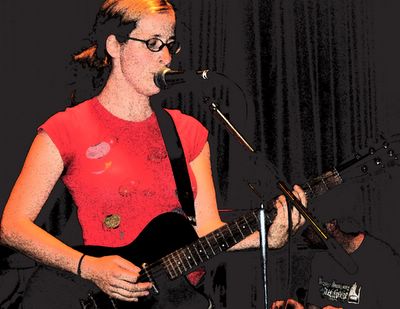Laura Veirs Comes to Cleveland

Marquee of the Beachland Ballroom: former Slavic cultural center of some sort now transformed into a standing-only music venue, and on a balmy night of September in the year 2005, locale for the second ever show in Cleveland of Laura Veirs (click for homepage with links to some of Veirs' songs). From what Veirs told the crowd, the Beachland Ballroom was also where she first played in Cleveland, with the only difference being that, on this occasion, more than a handful of people were there to see her play. The greater showing can be attributed in part to the fact that she was headlining for Sufjan Stevens (pronounced: SOOF-yahn). Fortune has it that Stevens, a fine musician and songwriter, is currently the more popular of the two. But this is not the place to discuss Sufjan's formidable work, since I went primarily to see Veirs and since the digital camera I was using failed me midway through her performance, thus curtailing my evening's photo-journalistic ambitions by more than half. Together, the two acts sold out the Ballroom, and by the end of Veirs's performance, the bulk of the ballroom floor was covered with feet. What follows in this post is less an analysis of Veirs's music -- which deserves at least a front-page appreciation by a magazine like Uncut -- than my impressions of one night of music, and my sense of Veirs, the songwriter and performer.

Laura Veirs at mic and guitar, probably not singing these words:
Here come the sailorsThe group did not achieve the frontal impact of practiced and polished stage performers. Still, a delight to the attentive ear: the four-member band captured the various timbres of distortion, the tasteful riffs, and harmonic coloring that mark a good deal of Veirs's music. The onstage performance might not be all that different from how Veirs and her band mates play in studio. They seemed to enjoy playing with each other, as evidenced by mutual smiles, glances, nods of various sorts. The cheery keyboardist Steve Moore was especially animated in this way, and it seems that his stage presence welled up on a few occasions, even to the point where I began to picture him as a sort of Ben Folds: an inspired and good-natured keyboard soloist capable of roping in an entire audience with his fingerwork and enthusiasm. Then again, Moore may turn out to be the American equivalent of Nicky Hopkins: a robust talent who sings back-up and applies his hands to a number of keyboards -- playing several during a single song, in some cases -- always adding parts that seem perfect.
Marching two by two by two
They pressed their pants and
Shined their shoes
Aren't they strapping and deranged?
The group's timing, dynamics, and harmonic intensity were impeccable for most of the night; but to enjoy the performance, as I did, I think it paid well to look in on the stage and take in the subtle interactions between the performers. For never having toured together before, the group is remarkably in tune with one another. You cannot expect them to jump out at you and compel you to dance or to overwhelm you with theatrical gestures or brute volume; but this fact takes nothing away from the music. There was incredible communication between all four players, whose combined efforts created a harmonic intensity that is far greater than what mere volume or physical agitation can achieve. Veirs might do well to turn her back less often to the audience and to face them other than from behind her microphone; she might also articulate her words better between songs. But for someone who loves Veirs's music, these unpolished elements of the performance mattered little.

Veirs often uses a thumb pick, which is presumably what she is reaching for here. She has a knack for wrapping powerful vocal lines around well-wrought guitar riffs, thereby enhancing the beauty of each. A fine example of this are the opening lines of "Ether Sings," which Veirs sings over a series of pull-offs on the first string while her thumb dances back-and-forth between the sixth and third strings of her guitar.

Steve Moore & Karl Blau, who typically plays bass but also plays guitar, collaborated on keyboards for one number. Tucker Martine, her brilliant producer and drummer, had agreed for the first time to join her and the others on the road, and so Veirs was on an inaugural tour with her entire three-piece supporting cast of musicians. The deceptively simple production that Tucker Martine employs in the studio allows Veirs's music to breath fully onstage. Nothing seemed lacking, and the four musicians often sounded like five or six, even when you blocked in your mind the occasional filler leaked in through a Mac.
If you feel you don't have an ear for "production," I think that, to appreciate Tucker's talent, you could simply compare the consistently articulate and clear sound of the albums he has produced for Veirs to the often muddled or overblown sounds on albums by comparable artists such as Rufus Wainwright and Nellie McKay. It did not surprise me when Tucker told me himself that, when faced with a choice between less or more, he generally opts for less -- a simple but useful principle that, he may know, philosophers call "Ockam's razor." (And why not apply it to music production?) Executing the maxim of "less is more" in the studio cannot be a simple matter, however, if one considers the countless failures of many other producers.
Now, imagine that you have a creative urge on par with that of Laura Veirs. One of her song's lines addresses this urge by means of a question.
Love of color, sound and wordsThough clearly this is not a question that calls for a one-sided answer, it does seem clear to me that Veirs is richly blessed not only with a talent for crafting original songs, but with the support of Steve Moore, Karl Blau, and Tucker Martine, all of whom contribute significantly to her music. The blessing is not lost on Laura Veirs. Finding her to be forthright and unassuming, I was able to speak with her for some 30 minutes as she sat behind her merchandise table and, at one point, she opened the booklet of lyrics for her recent album to the page showing a photograph of her and her band mates seated in the yard of a modest suburban home. Not only was the black-and-white photo impressive in its own right (as with the all the packaging and presentation of Veirs's work, which Jason Lutes has created for her last few albums), but so was her gesture. I'm sure that she was just as happy to share with me the quality of the photo as the close relationship between band mates that it suggests. Veirs is the master of her craft and fully appreciative of the talent that surrounds her.
Is it a blessing or a curse?
I looked for an opinion on Veirs's music online and came across the following at allmusic, a brief overview written by Richie Unterberger:
Seattle singer/songwriter Laura Veirs sings personal songs of romantic intoxication, everyday vignettes, and occasional social commentary that are often heavy on introspection and intense character scrutiny. Her vocals and melodies rapidly shift and veer, true to her name, up and down her wide vocal range.I'm not sure about "romantic intoxication" or "heavy on introspection" or "intense character scrutiny." None of these conveys the uniqueness of Laura Veirs's musical artistry. Does she have a wide vocal range? That's not clear to me, either. What she does have, however, is a clear artistic vision -- one that is all her own, and a voice that is not borrowed or imitative. Her imagery is her own, and she avoids stock phrases. She is not a virtuosic player or singer, and neither are her accompanying musicians and vocalists, but all the parts are well executed, and the whole is arranged and produced so well as to give the impression of virtuosity.
Veirs conveys her own vision of things and avoids the trite or grating line. So, if there is "romantic intoxication," or "introspection" in Veirs's work, these things are only an indirect and unintended effect of Veirs's well-crafted lyrics, rather than an obvious theme or target. "Romantic intoxication" and "introspection" might fit better as labels for all the aspiring female singer-songwriters that get played daily on NPR and in your local Starbucks. It is Veirs's uncompromising artistry that puts her leagues above these contemporaries. However personal the stamp she places on all that she creates, her perspective is too close to that of the poet Robinson Jeffers, she has too grand a view of the universe, to get locked in "introspection." Beyond the mere question of poetic vision, unlike many "introspective" sorts, Veirs's voice is mixed well above the music, and this fact means that her subtlety is earned by her lyrical smarts and unaffected vocals, and not concocted by a producer hiding her voice behind instruments, or dressing it up in reverb and delay. (Credit, again, Tucker Martine.) R.E.M. once used faint vocals and inarticulate singing to create a sense of inward mystery; but this approach has had its run, and it would be ruinous for anyone to take it up again today.
Laura Veirs, I believe, has staying power. She inherits and crystallizes musical traditions (folk, pop, blues, grunge) into a unified and personal artistic vision. Her mind consistently produces beautiful things to listen to and ponder, and her musical skills have blossomed fast and furiously. She's attuned to infinite spaces and geographical forms. Her writing, she knows, does not have to be limited by a single narrative idea. However, she's far from sinking into political cynicism, so it would be wrong only to see in her writing "introspection" and detached imagery. In short, with her last few albums, Veirs has already carved out at least one world of musical and poetic invention. There's no reason to believe that many more worlds are not lurking within her.

L.V. playing her Martin guitar, possibly under the sway of these lines (from "The Cloud Room"):
Music in the airPostscript: On the very rare occasion when I discover an artist as good as Veirs and realize, as I did again in Cleveland this past week, that she remains unknown to so many, I am galvanized anew to look for music outside of the massive marketing-dug channels that grind their way into everyone's lives, in shopping malls, on Web sites, on public transportation, shoving predictable and most often downright horrific music at a largely unsuspecting public, while leaving true talent starved for exposure.
Plucked from the centuries
Presented in the form
Of a song by you to me
Seagull in the air
Floating in the updraft
See me on the ground
Think I just heard her laugh
This sort of discovery also tries my patience when the onslaught of bad taste starts to overwhelm. While paying for clothes last week in a shopping mall, I was handed, as a perk for my purchase, a CD full of what could only be identified as crap called music. Massive poster boards of the corporate representatives whose music is featured on the CD were hung here and there above the store's apparel. I did not know whether to assume quiet possession of the CD or step on it with crushing force, but my footwear was too meager to have the effect desired, so I left the CD in the bag and am determined to find a spectacular way of exercising violence against it soon.
Speaking of music that suffers from underexposure, this site supports unheralded groups, and Pandora helps one find new artists based on one's current favorites.
...............................................................................What follows are some Laura Veirs-related links. For a reason that, in discussing the matter, neither I nor Laura Veirs was able to pin down, the French have a better appreciation of her achievements than do her fellow Americans.
A review of Veirs's work in which the writer concludes that Year of Meteors "will make you smarter, more sensitive, and probably a better lover -- and there are not too many albums you can say that about."
From Spin.com, a short piece that situates Veirs within a "neo-folk" movement.
Excellent interview (in French) in which Veirs reveals what the interviewer calls "the privileged domains that nourish her inspiration."
An overview of Veirs's latest works (in French), in which Veirs is acknowledged to have "confirmed, once again, her place among the great songwriters of folk music."
Interview with Laura (in French) in which she says that Ani DiFranco inspired her to undertake her own career.
A review of the album Carbon Glacier (in French), in which the writer says, "one rarely has the opportunity to listen to balads whose melodies are so sweet, so well arranged and sung."
all photos by fanni terrette (thanks, Pete, for lending me the camera!) (16950)
<< Home